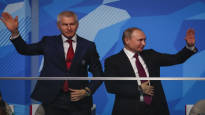Russian bosses say the country is still a superpower in sports, but recent events tell something completely different, writes Jelena Leppänen.
Jelena Leppänen sports reporter
In Perm, located next to the Ural Mountains, an event of the Russian Ministry of Sports was organized in October with the grandiose name: “Russia – a superpower of sports”.
The main message of the sports forum followed a formula familiar to Russian rulers. The program featured the raising of national sentiment, sacrifice and harsh criticism from the international sports community.
The purpose of the Perm event was to show that Russian sports are doing great despite numerous international bans. The president who spoke at the event Vladimir Putin sports and its strong development are the absolute number one priority for the state.
However, voices have come to the public that tell a completely different story.
Popular video blogger Vitja Kravchenko interviewed in the fall GM of the Russian national volleyball team and sports legend Sergei Tetyuhin. The 2012 Olympic champion admitted that the country’s volleyball is in dire need of international competition. According to Tetjuhin, the event, which was organized by the Russian Ministry of Sports last year as a substitute for the international games, had been a complete flop as far as volleyball was concerned.
Previously, Kravchenko has reported on the sad state of Russian athletics. The number of enthusiasts, training frameworks and resources are only a pale shadow of what they used to be, and young track and field athletes have no information about their future career prospects.
According to critics, figure skating, dominated by Russians, is also slipping downhill. Beijing Olympic gold and silver medalists Anna Shcherbakova19, and Aleksandra Trusova, 19, are on an indefinite break from competition. In addition to them, a number of prize medalists have withdrawn from the competitions completely or temporarily. Although there are quadruple jumping talents among the juniors, there are no guarantees of the new generation’s brilliance.
There are plenty of similar examples across genre boundaries.
A visit to North Korea
Russia, waging a war of aggression, has become an outcast in most sports, even though the country’s sports bosses like to say otherwise.
Perhaps the state of the country was most clearly emphasized by the Minister of Sports Oleg Matytsin recent visit to North Korea.
Matytsin met his colleagues in Pyongyang Kim Il-guk too. According to the information released to the public, the two toured local attractions and discussed the development of sports. The visit culminated in the signing of a cooperation agreement extending to 2026.
The countries agreed to cooperate in coaching different sports, sports medicine and organizing sports events.
Minister Matytsin’s state visit aroused a lot of amusement on Russian discussion forums and social media. When a full-scale war started in Ukraine in February 2022, many Russians joked that their country would become the new North Korea with the sanctions. Now they were able to state that the journey in that direction is underway.
“I can imagine how it leaves our sports decision-makers to have to make deals with countries like North Korea and pretend to the people that everything is great,” one Sports.ru sports website the reader described.
Similar reactions were noticeable when the country’s Ice Hockey Federation reported on the latest twists and turns related to the national team tournament to be held in St. Petersburg in mid-December.
The event called Ykkökanava cup replaces the former EHT tournament, in which before the war of aggression in Russia, in addition to the host country, Finland, Sweden and the Czech Republic participated. This year, along with Russia, Belarus, Kazakhstan and China were invited to the tournament, but the last one refused to come.
Now in St. Petersburg, Russia’s second team will be seen, which, in addition to the KHL players, has also included hockey players from the VHL, i.e. the local Mestis. The team brought in to replace China is named “Tähdet ja VHL”.
China is not exactly a hockey giant, and the country’s absence is not significantly reflected in the level of games. However, the losses are an embarrassing blow to the Russian puck deciders who heavily marketed the tournament.
They concretely show how isolated Russian sports are.
